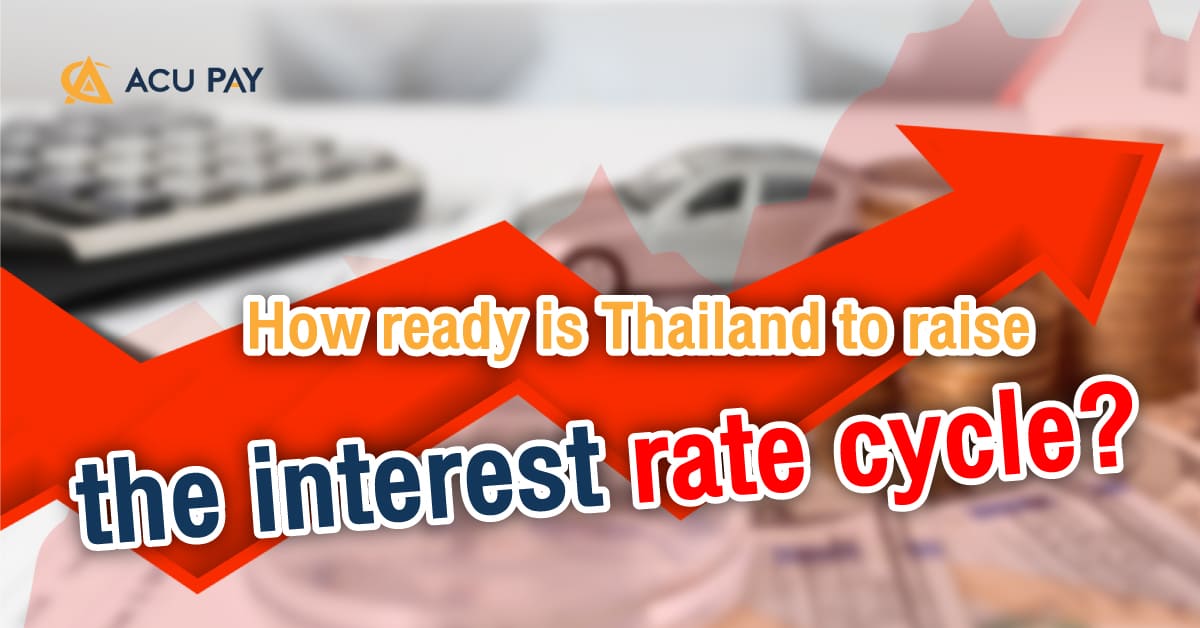

For August 2022, we are quite confident that the Bank of Thailand (BOT) will raise the policy interest rate for the first time in years.
In academic language, it is monetary policy normalization.
because the current policy interest rate level is 0.50% per annum. This is the lowest level that has ever been seen since the Bank of Thailand started using the policy rate as a tool for monetary policy in 2000.
We have reached this point because the Thai economy has been severely affected by the COVID-19 crisis. Monetary policy with ultra-relaxation is a must.

However, the Monetary Policy Committee (MPC) recently assessed that the Thai economy is likely to clearly recover. The MPC predicts that the Thai economy will grow by 3.3 percent per year, up from 1.5 percent per year last year. and will grow at a rate of 4.2 percent per year over the next year.
In this prediction, the MPC has already included the effect of the upcoming policy rate hike. When the economy returns to normal, the abnormal policy interest rates will no longer be necessary.
In addition, the Thai economy faces new risks from an accelerating inflation rate. The MPC thinks that even raising the policy interest rate will not be able to reduce inflation that comes from supply. But it can help keep inflation from rising further by reducing the pressure from demand-side inflation that comes with the economic recovery and inflation that comes from prediction.
However, it is undeniable that higher policy interest rates increase financial costs for the economy. Besides, Thailand already has high household debt problems. It is not surprising that many parties are concerned that the Thai economy is not ready for a policy rate hike as the MPC has said.
Factors that will be affected if interest rates are raised
To address this issue, we will invite you to look at the information on how much the policy rate hike will affect the debt repayment servicing ability of businesses and individuals.
The first factor to consider is the interest coverage ratio of the business sector. and interest expense ratio on household income. which tells us how vulnerable businesses and households are to interest rate exposure. Based on information from the stock exchange and the Ministry of Commerce, they found that interest expenses are only 2–4% of the total cost of the business. Most of the rest are raw material costs and labor costs. while the household sector is more at risk of interest rate hikes. According to the Bank of Thailand’s household debt database (excluding informal debt), it was found that interest expenses accounted for about 8% of household income with debt. which is considered quite a lot.
The next factor to consider is the term structure of interest rates. That is a floating interest rate or a fixed interest rate. If it’s a fixed interest rate, interest rates will go up. It will affect only those who need a new loan.
Let’s start with the business sector. In the case of small and medium-sized enterprises (SMEs), funding will be mainly through loans. But if it is a large business, it will raise funds through both loans and debenture issuance. The majority of business loans (60 percent) had floating interest rates linked to the benchmark interest rate such as MLR.
Conversely, if it is crowdfunding through issuing debentures, it will be a fixed interest rate. Therefore, it is not surprising that there is a forecast by the Thai Bond Market Association that new bond sales this year may reach 1.2 trillion baht, a record high. As large corporations will maintain interest costs through bond issuance to cope with the rising interest cycle,
However, it must be said that interest rates in bond markets have now risen in line with bond yields. This is because government bond yields over a year old will respond more to the rising global interest rate cycle than short-term bond yields, which are primarily determined by the Bank of Thailand’s policy rate. According to the information from the Thai Bond Market Association, it was found that yields on government bonds over 3–7 years old have risen 0.8–1.1% per annum from the beginning of the year. This means that businesses that have been crowdfunded through debentures this year have already faced higher financial costs, even though the Bank of Thailand has not yet raised the policy interest rate.
Most of the households’ loans (60 percent) are fixed-rate loans. (Car loans, credit card loans, and unsecured personal loans) or loans with floating interest rates (home loans). Borrowers still have the same monthly installments, need a longer repayment period. Most household loans with floating interest rates that do not have fixed installments are loans for businesses. especially farmer’s loans.
Therefore, for the general household, If the benchmark interest rate doesn’t rise much, the increase in interest rates will have a significant effect on households requiring new loans. which, in a positive way, helped to slow the expansion of household debt. This is different from the business sector that is affected by both new and old debts.
The last factor to consider is the transition from the policy interest rate to the benchmark interest rate. This is because household and business interest rates are not tied to the policy rate. but tied to the benchmark interest rate. As a result, the policy rate hike will be curtailed if the benchmark interest rate increases slower than the policy rate.
According to historical data, the MPC has raised the policy rate three times in the last 22 years. For the first time (August 2004-June 2006), the MLR did not raise the interest rate until a year had passed, while in the last 2 times (July 2008-August 2008 and July 2010-August 2011), the MLR has responded immediately.
Furthermore, it was discovered that, on average, the MLR rose only 60% of the policy interest rate hike. This indicates that the policy interest rate hike is not fully passed on to households and businesses.
From a study by the Bank of Thailand’s Monetary Stability Department, under the assumption that the policy interest rate will rise to 2–2.75% per annum by the end of 2023 and the amount of transmission from the policy rate to the MLR is equal to In the past, it was found that if economic growth and inflation were in line with the MPC’s expectations, both the business sector and the household sector had sufficient debt repayment capability to support the increase in the policy rate even in the event that the policy rate rises to 2.75% per annum. This is partly because the effect of the policy interest rate is mitigated by the interest rate structure. and the increase in the benchmark interest rate is less than the policy rate. But another important part is that the Thai economy is on an uptrend, which helps with income and employment.
However, what has been said above is a general view. We know that the recovery of the Thai economy is in a K-shape where some businesses and households have a slow recovery and/or are affected by a very high cost of living, especially SMEs in tourism, transportation, trade, and building materials, and low-income households. Resolution of the Financial Institutions Policy Committee (FIPC) to allow financial institutions to help debtors who are still affected by the COVID-19 crisis, including restructuring existing debt and new top-up through credit, including an extension of the measure to reduce the credit card debt repayment rate at a minimum of 5 percent per year for another year, in line with the MPC’s policy in the previous period to take care of vulnerable groups before raising the policy rate.
In summary, I think the Thai economy is ready to cope if the Thai economy continues to recover as the MPC assesses and the inflation rate does not accelerate too high until the MPC has to adjust the policy rate to 4 to 5 percent.
Referrence: bot